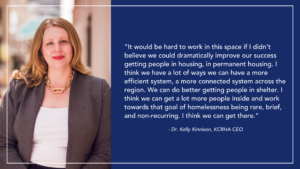Partnership for Zero is a pilot project that began outreach work one year ago to try a new model of addressing unsheltered and chronic homelessness in Seattle’s Downtown and Chinatown International District. The pilot was designed to develop knowledge and learning that will be applied to the homeless response system in King County, and it achieved several accomplishments towards that goal.
Since the departure of KCRHA’s first CEO, the agency has been conducting a full assessment of operations. This work includes a review of our governance structure and a close look at our operations and programs, including Partnership for Zero.
Initial funding for the pilot program has now expired. In addition, KCRHA and partners recognize that the need for unsheltered services in Downtown Seattle and the Chinatown International District is greater than the capacity of the Partnership for Zero pilot. We also recognize that there are challenges in having an administrative agency deliver direct service.
KCRHA is winding down the Partnership for Zero pilot program. Unfortunately, this means that KCRHA must lay off members of the Partnership for Zero team.
We want to acknowledge the hard work that went into Partnership for Zero, and extend our gratitude to the team that moved it from theory to action—a team that brought their lived experience, expertise, and deep passion and care to the work. We also want to highlight the accomplishments and learnings that will carry forward throughout our system response because of this important work.
Accomplishments
The pilot achieved several significant accomplishments, and created knowledge and learning that is being applied to improve our community’s homeless response system.
Lessons learned through Partnership for Zero will be integrated into KCRHA’s work across the homeless response system as a whole. To apply the learnings of Partnership for Zero across the system, KCRHA is developing new limited time positions that will be posted internally, with current staff encouraged to apply. Current clients housed through Partnership for Zero will continue to be supported.
Accomplishments include:
- Partnership for Zero resolved six long-standing encampments and housed more than 230 people that had been living unsheltered in Seattle’s downtown and Chinatown International District. The housing process includes more than rental assistance; it includes outreach, assessment of housing and health care needs, obtaining necessary identification, navigating human services, finding appropriate housing units, support with rental applications and move-in, and stability support for one year after move-in.
- Emergency management protocols developed through Partnership for Zero were applied to place 175 people into appropriate shelter and housing after the collapse of the hotel program run by the Lived Experience Coalition, earning state and county support, and coordinating with multiple community and service provider partners.
- The pilot developed infrastructure, knowledge and learning that can be integrated into KCRHA’s work across the homeless response system—including better data management and By Name Lists, centralized identification and acquisition of housing units, an encampment resolution process, and a Housing Command Center model to provide a centralized, coordinating body for emergency management protocols and rapid problem solving, with stronger collaboration and coordination across teams and service providers.
- It brought the concept of a new model to life, pressure tested the nuts and bolts of how the model could work, and produced invaluable learnings we can carry forward.
Partnership for Zero is an example of the collaboration necessary to our path forward in addressing unsheltered homelessness. The effort reaffirmed the importance of working closely with our service provider community to develop the promising practices that will improve the homeless response system. We remain committed to the practice of working together—centralizing and coordinating assets and resources, continuous improvement driven by data, and centering the unique needs and experiences of the people we serve.
The Path Forward
KCRHA was created to help unify our homelessness response system—to support and coordinate the system in service of one shared path forward. The Partnership for Zero pilot represented an important opportunity to implement a new way of approaching homelessness response as emergency management, and that approach can be applied to future efforts. At the same time, in an environment of limited resources and urgent need, KCRHA’s focus needs to be on the core functions of contracts, systems administration, and implementation of the Five Year Plan—supporting our provider partners working across King County.
With our partners in human services, business and philanthropy, and at the City of Seattle and King County, we are taking steps to ensure that implementation of the lessons learned through Partnership for Zero can move forward to improve the system as a whole.



